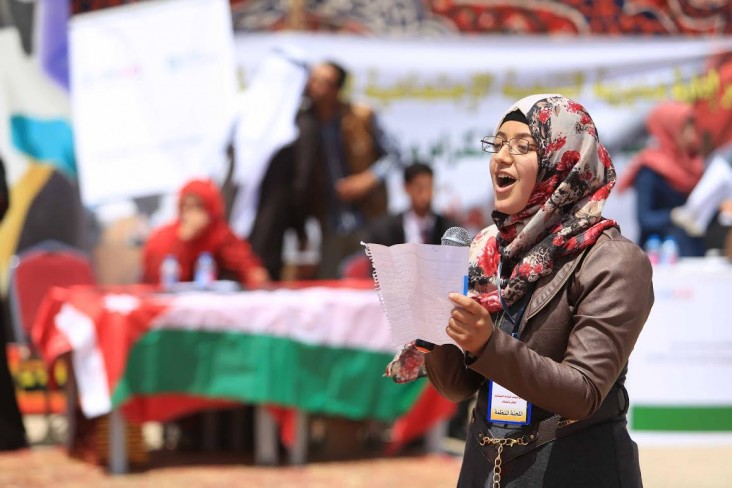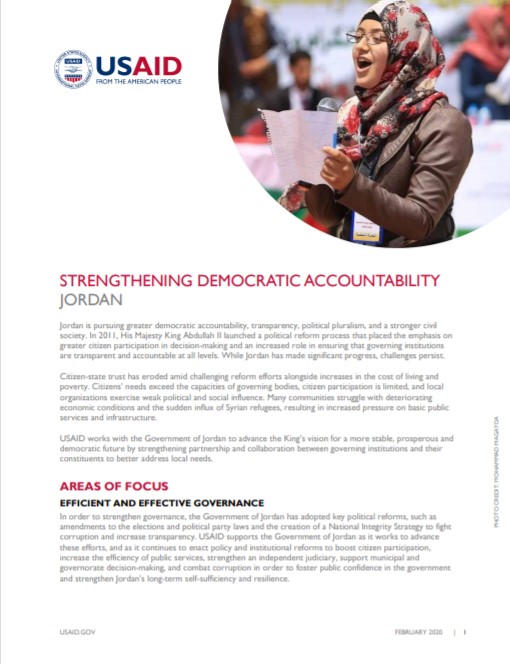Speeches Shim

Jordan is pursuing greater democratic accountability, transparency, political pluralism, and a stronger civil society. In 2011, His Majesty King Abdullah II launched a political reform process that placed the emphasis on greater citizen participation in decision-making and an increased role in ensuring that governing institutions are transparent and accountable at all levels. While Jordan has made significant progress, challenges persist.
Citizen-state trust has eroded amid challenging reform efforts alongside increases in the cost of living and poverty. Citizens’ needs exceed the capacities of governing bodies, citizen participation is limited, and local organizations exercise weak political and social influence. Many communities struggle with deteriorating economic conditions and the sudden influx of Syrian refugees, resulting in increased pressure on basic public services and infrastructure.
USAID works with the Government of Jordan to advance the King’s vision for a more stable, prosperous and democratic future by strengthening partnership and collaboration between governing institutions and their constituents to better address local needs.
AREAS OF FOCUS
EFFICIENT AND EFFECTIVE GOVERNANCE
Strengthening Democratic Accountability ![]() (pdf - 266k)
(pdf - 266k)
In order to strengthen governance, the Government of Jordan has adopted key political reforms, such as amendments to the elections and political party laws and the creation of a National Integrity Strategy to fight corruption and increase transparency. USAID supports the Government of Jordan as it works to advance these efforts, and as it continues to enact policy and institutional reforms to boost citizen participation, increase the efficiency of public services, strengthen an independent judiciary, support municipal and governorate decision-making, and combat corruption in order to foster public confidence in the government and strengthen Jordan’s long-term self-sufficiency and resilience.
STRONG CIVIC ENGAGEMENT
USAID works with civil society and the Government of Jordan to strengthen political and civic engagement at all levels so that governing institutions effectively reflect and respond to the ever-changing needs of the population. USAID advances political participation and civic leadership opportunities, particularly for women and youth, and enables civil society organizations to effectively represent and advocate the interests of all Jordanian people. USAID also inspires the next generation of Jordanians to be more engaged in the governance of their country through creative civic literacy and engagement programs in schools and universities throughout the country.
ADVANCING CITIZEN RIGHTS
USAID partners with the Jordanian government and civil society to advance the rights of all citizens, with a focus on women, people with disabilities, and other marginalized groups. USAID helps the Jordanian judiciary, public sector entities, and civil society to advance policies and reforms that protect the rights and interests of the entire Jordanian population and expand access to essential services. At the same time, USAID equips marginalized groups with skills and resources to advocate for their rights and actively participate in their country’s development.
NOTEWORTHY ACHIEVEMENTS
- With USAID assistance, the Government of Jordan has adopted more than 40 e-services in the Ministries of Justice, Industry and Trade, and Social Development to improve the transparency and efficiency of the public sector and expand access to public services, bringing Jordan closer to the King’s vision of a paperless government by 2020.
- The Government of Jordan requested the nationwide expansion of USAID’s targeted local economic development activities, including the preparation of strategic and development plans for all 12 governorates and 100 municipalities and the development of maps to inform systematic street naming and building numbering across the country. This work promotes investment partnerships with other donors and private-sector actors and links citizens' priorities to national-level development planning.
- In 2019, Jordan’s Judicial Council established its first General Secretariat, budget office, and administrative units under the Judicial Council with USAID support, enabling it to oversee the Judicial Institute of Jordan, which determines judgeship qualifications, controls entrance to the judiciary, and trains judges. Power over the Judicial Institute, as formalized in the 2019 Judicial Independence Amendment, advances the independence of the judiciary, bolstering checks and balances between Jordan’s executive, legislative, and judiciary branches.
- USAID helped Jordan establish and strengthen the Independent Election Commission and engage more than 3,000 officials, activists, and youth to inform election reform. Building on work with Jordanian schools and universities to provide civic education and advocacy training, USAID helped the commission engage 19,000 youth in voter outreach activities for the 2017 elections and supported local and international observation.


Comment
Make a general inquiry or suggest an improvement.